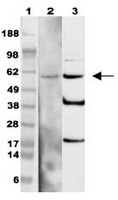ST1115 Sigma-AldrichAnti-PDK1 (1-556) Rabbit pAb
Productos recomendados
Descripción
| Replacement Information |
|---|
Tabla espec. clave
| Host |
|---|
| Rb |
| Product Information | |
|---|---|
| Form | Liquid |
| Formulation | Undiluted serum. |
| Positive control | HEK293 cells |
| Preservative | ≤0.1% sodium azide |
| Applications | |
|---|---|
| Key Applications | Immunoblotting (Western Blotting) |
| Application Notes | Immunoblotting (1:3000) |
| Application Comments | Antibody should be titrated for optimal results in individual systems. |
| Biological Information | |
|---|---|
| Immunogen | full-length, recombinant, human PDK1 |
| Immunogen | Human |
| Host | Rabbit |
| Isotype | IgG |
| Physicochemical Information |
|---|
| Dimensions |
|---|
| Materials Information |
|---|
| Toxicological Information |
|---|
| Safety Information according to GHS |
|---|
| Safety Information |
|---|
| Product Usage Statements |
|---|
| Packaging Information |
|---|
| Transport Information |
|---|
| Supplemental Information |
|---|
| Specifications |
|---|
| Global Trade Item Number | |
|---|---|
| Número de referencia | GTIN |
| ST1115 | 0 |
Documentation
Referencias bibliográficas
| Visión general referencias |
|---|
| Feldman, R., et al. 2005. J. Biol. Chem. 280, 19867. Kikani, C., et al. 2005. J. Cell Biochem. 96, 1157. Mora, A., et al. 2004. Semin. Cell Dev. Biol. 15, 161. Lim, MA, et al. 2003. Proc. Natl. Acad. Sci USA 100, 14006. |
Folleto
| Cargo |
|---|
| Diabetes and Obesity |








